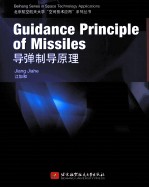图书介绍
导弹制导原理 英文2025|PDF|Epub|mobi|kindle电子书版本百度云盘下载

- 江加和编著 著
- 出版社: 北京:北京航空航天大学出版社
- ISBN:9787512407527
- 出版时间:2012
- 标注页数:312页
- 文件大小:68MB
- 文件页数:325页
- 主题词:导弹制导-英文
PDF下载
下载说明
导弹制导原理 英文PDF格式电子书版下载
下载的文件为RAR压缩包。需要使用解压软件进行解压得到PDF格式图书。建议使用BT下载工具Free Download Manager进行下载,简称FDM(免费,没有广告,支持多平台)。本站资源全部打包为BT种子。所以需要使用专业的BT下载软件进行下载。如BitComet qBittorrent uTorrent等BT下载工具。迅雷目前由于本站不是热门资源。不推荐使用!后期资源热门了。安装了迅雷也可以迅雷进行下载!
(文件页数 要大于 标注页数,上中下等多册电子书除外)
注意:本站所有压缩包均有解压码: 点击下载压缩包解压工具
图书目录
CHAPTER 1 Introduction to Missile Guidance1
1.1 Development History of Rockets and Missiles1
1.2 Categories of Guided Missiles2
1.3 Missile Guidance Systems4
1.4 Introduction to Command Guidance System6
1.5 Introduction to Homing Guidance System8
1.5.1 Basic Concept and Classification of Homing Guidance System8
1.5.2 Introduction to Seeker9
1.6 Brief Introduction to Guidance Laws13
1.7 Autopilots14
1.8 Outline of the Book15
References16
CHAPTER 2 Basic Knowledge of Flight Dynamics17
2.1 Coordinate Frames17
2.2 Motion Parameters19
2.3 Geometrical Parameters of Vehicle22
2.4 Forces and Moments Acting on Vehicle23
2.4.1 Gravity24
2.4.2 Thrust24
2.4.3 Aerodynamic Forces26
2.4.4 Aerodynamic Moments30
2.5 Hinge Moments of Control Surfaces36
References37
CHAPTER 3 Equations of Motion for Vehicle38
3.1 Introduction38
3.2 Dynamic Equations40
3.2.1 Force Equations40
3.2.2 Moment Equations41
3.3 Kinematical Equations42
3.3.1 Kinematical Equations of the Mass Center of Vehicle42
3.3.2 Angular Motion Equations45
3.4 Small-disturbance Theory47
References51
CHAPTER 4 Longitudinal Motion52
4.1 State Variable Representation of the Linearized Longitudinal Equations52
4.2 Longitudinal Transfer Functions54
4.3 Longitudinal Approximations56
4.3.1 Short-period Approximation56
4.3.2 Short-period Approximation Transfer Function57
4.3.3 Effect of Altitude and Airspeed on Short-period Mode Characteristic Parameters58
4.3.4 Long-period Motion Approximation59
4.3.5 Effect of Altitude and Airspeed on Long-period Mode Characteristic Parameters60
4.4 Effects of the Variation of Aerodynamic Derivatives on the Longitudinal Motion61
4.5 Solution of the Longitudinal Equations(Control Surface Locked)62
4.6 Transient Response of Vehicle67
4.7 An Integrated Example70
References76
CHAPTER 5 Lateral Motion77
5.1 State Variable Representation of the Linearized Lateral Equations77
5.2 Lateral Transfer Functions79
5.3 Lateral Approximations83
5.3.1 Roll Approximation83
5.3.2 Effect of Altitude and Airspeed on Roll Mode Characteristic Parameters84
5.3.3 Dutch Roll Approximation84
5.3.4 Effect of Altitude and Airspeed on Dutch Roll Mode Characteristic Parameters85
5.3.5 Spiral Approximation85
5.4 Effect of Aerodynamic Derivative Variation on Lateral Dynamics Characteristics86
5.5 Examples of Lateral Motion87
5.6 Small Disturbance Motion Equation Reduction for a Missile with Two Symmetrical Planes96
References103
CHAPTER 6 Flight Control of Missile104
6.1 Introduction104
6.2 Control Force Generation105
6.2.1 Aerodynamic Force Control105
6.2.2 Thrust Vector Control107
6.2.3 Rocket Injection Control109
6.3 Steering Components109
6.3.1 Aerodynamic Control Surfaces109
6.3.2 Jet Steering Components111
6.4 Missile Maneuverability and Load Factor112
6.5 Control Surface Specification114
6.6 Flight Control System with Attitude Control116
6.6.1 Control System Components116
6.6.2 Longitudinal Control117
6.6.3 Lateral Directional Control119
6.7 Guidance System with Acceleration Control121
6.7.1 Acceleration Control121
6.7.2 The Two-acceleration Lateral Autopilot124
6.8 Roll Rate Stabilization126
6.9 Missile Servos126
6.9.1 Pneumatic Servos127
6.9.2 Hydraulic Servos129
6.9.3 Electric Servos130
6.10 Gyroscopes130
6.11 Free or Position Gyroscopes133
6.12 Rate Gyroscopes134
6.13 Accelerometers135
6.14 Altimeters137
References138
CHAPTER 7 Guidance Laws139
7.1 Motion of a Target139
7.2 Remote Control Guidance Method142
7.2.1 Three-point Method143
7.2.2 Lead Angle Method149
7.3 Homing Guidance Relative Motion Equations150
7.4 Pursuit Method153
7.5 Constant-bearing Guidance155
7.6 Proportional Navigation155
References164
CHAPTER 8 Autopilot Design165
8.1 Introduction165
8.2 Autopilot of Roll Channel167
8.3 Autopilot Design Considering Body Flexibility171
8.4 Nonlinear Stability Loop Design for Roll Channel177
8.5 Acceleration Control System Design182
8.6 Longitudinal Control System Design for Cruise Missile187
8.7 Lateral Control System Design for Cruise Missile192
References198
CHAPTER 9 Command Guidance Systems199
9.1 Principle of Command Guidance199
9.1.1 Introduction199
9.1.2 Actual Flight Phases203
9.1.3 Command Generation204
9.2 Guidance Stations207
9.2.1 Basic Concepts of Radars208
9.2.2 Types of Guidance Stations213
9.2.3 Radars of Guidance Stations215
9.2.4 Guidance Radar Systems216
9.3 Linear Scan Radar218
9.3.1 Angle Measurement218
9.3.2 Range-tracking Systems221
9.3.3 Components of Linear Scan Guidance Radar223
9.4 Commands Transmission227
9.4.1 Transmission Channel227
9.4.2 Command Types227
9.4.3 Multiplex Manners of Commands228
9.4.4 Modulation of Commands228
9.4.5 Transmission Time Arrangement of Command Pulses229
9.4.6 Command Pulse Encoding231
9.4.7 Command Decoding and Demodulation232
9.5 Brief Introduction to Optical-electronic Technique233
9.6 Monopulse Guidance Radar234
9.6.1 Amplitude-comparison Monopulse234
9.6.2 Phase-comparison Monopulse239
9.7 Phased-array Radar241
9.7.1 Principle of Phase Scanning241
9.7.2 Space Feed245
9.7.3 Phase Shifters247
9.7.4 Angle Measurement of Phased Array Radar248
9.7.5 Range and Angle Tracking System of Phased Array Radar251
9.7.6 Brief Introduction to Multi-function Phased Array Radar252
9.8 Command Guidance System Design253
References255
CHAPTER 10 Homing Guidance Systems256
10.1 Basic Concepts of Homing Guidance256
10.1.1 Components of Homing Guidance System256
10.1.2 Classification of Homing Guidance257
10.1.3 Rate of Change of Line-of-sight259
10.1.4 Guidance Command of Homing Guidance System260
10.2 Homing Heads261
10.2.1 Introduction to Homing Heads261
10.2.2 Radar Homing Heads263
10.3 Semi-active Radar Homing Heads264
10.3.1 Main Technique Performance264
10.3.2 Work Principle of a Semi-active Continuous Wave Seeker267
10.3.3 Target Illumination280
10.4 Brief Introduction to Active Radar Homing Head280
10.5 Antenna Boresight Stabilization and Track281
10.5.1 Gyro Stabilization Platform Scheme282
10.5.2 Rate Gyro Feedback Scheme283
10.5.3 Noises Acting on Homing Heads285
10.6 Infrared Seekers286
10.6.1 Infrared Radiation286
10.6.2 Introduction to Detectors287
10.6.3 Infrared Point Source Seekers289
10.6.4 Infrared Imaging Seekers292
10.7 Homing Guidance System Design294
10.7.1 Homing Guidance Geometrical Relation294
10.7.2 Example of Homing Guidance System Design295
10.8 Homing Guidance System Model297
10.8.1 Nonlinear Kinematical Element of Homing Guidance297
10.8.2 Block Diagram of Homing Guidance System Model298
References299
CHAPTER 11 Hardware-in-the-loop Simulation of Guidance and Control System300
11.1 Functions of Hardware-in-the-loop Simulation300
11.2 Hardware-in-the-loop Simulation System300
11.2.1 Hardware-in-the-loop Simulation System Components300
11.2.2 Subsystem Functions302
11.3 Simulation Equipments304
11.3.1 Three-axis Flight Simulator304
11.3.2 Hydraulic Load Simulator308
11.3.3 Linear Acceleration Simulator310
11.3.4 Simulation Computer311
11.3.5 Infrared Target Simulator311
热门推荐
- 3775893.html
- 1091370.html
- 1497684.html
- 1738112.html
- 2234253.html
- 3884205.html
- 2943250.html
- 3254819.html
- 2880434.html
- 2762090.html
- http://www.ickdjs.cc/book_1178809.html
- http://www.ickdjs.cc/book_3577908.html
- http://www.ickdjs.cc/book_2844831.html
- http://www.ickdjs.cc/book_1199005.html
- http://www.ickdjs.cc/book_1014351.html
- http://www.ickdjs.cc/book_3677925.html
- http://www.ickdjs.cc/book_430925.html
- http://www.ickdjs.cc/book_1678350.html
- http://www.ickdjs.cc/book_737310.html
- http://www.ickdjs.cc/book_2619033.html